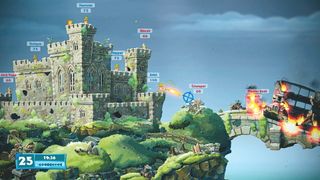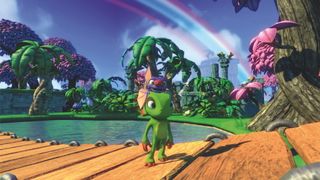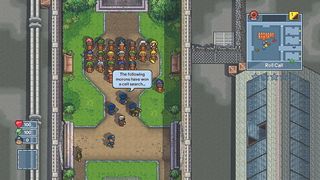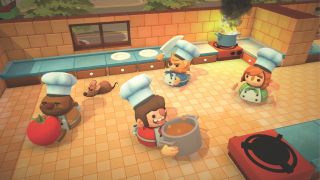This interview was conducted by Xbox: The Official Magazine
For a small studio that was first founded in 1990 and was best known for creating the Worms series, Team17 has made some seriously impressive leaps into the spotlight in recent years, helping bring the likes of Overcooked and Yooka-Laylee to gamers around the world. But just how have they gone from the team behind Worms to the indie superstars they are today? We speak to CEO and co-founder Debbie Bestwick, creative director Kev Carthew and senior producer Ian Pickles to find out what makes their team so strong.
OXM: Team17 feels like it’s grown hugely over the last few years – what do you think that’s down to?
Debbie Bestwick (DB): Our vision and the sheer passion and determination of all of our team. We’ve all worked incredibly hard to establish our games label. We recently celebrated signing our 20th game to the label, Yoku’s Island Express, a stunning hand-painted pinball platformer featuring pint-sized protagonist dung beetle Yoku. Here’s a funny, outstanding fact – when we released Yooka-Laylee in April, it was Team17’s 90th game.
Kev Carthew (KC): I think it’s a mixture of keeping Worms successful over the years and embracing new business ideas. We’re always tinkering with its design to bring something new to it, and Worms has been able to find a new audience as new platforms have emerged and new markets have opened up. We were quick to bring our games to the likes of Xbox Live Arcade and the App Store, and that’s helped to bring them to a new generation of gamers.

OXM: What inspired you to transform Team17 from the studio behind Worms into the successful publisher you guys have become today?
DB: We originally started life back as a publisher when Team17 was founded in 1990, working with the likes of Housemarque on Super Stardust and Epic on Silverball. Towards the end of 2013, I was looking for a new challenge and wanted to be able to help give something back to help build future development studios and help existing development teams. Team17 was doing really well and we were in a very fortunate position with a wealth of personal experience to share. We wanted to raise awareness for new IP creation and aid building new independent studios that retain creative control and ownership of IP. It’s something that’s very close to our hearts and something we stand up for.
OXM: How has that changed the dynamic within the studio?
DB: We’ve definitely ended up utilising our internal development team more than we anticipated. This has been really interesting and has allowed our internal team to be in a fortunate position of keeping refreshed. They get the opportunity to work on such a wide variety of games. Staffing has increased in excess of 25% and we are actively recruiting in many areas. We even implemented our own incubation programme, which enables developers to work out of the Team17 offices with a full dedicated team supporting them to realise their game’s full potential. This is a unique offering which benefits newer or smaller developers especially. Having a dedicated and experienced support team to call on for advice can be invaluable.
So far we’ve incubated solo indie developer Sherida Halatoe of Tiger & Squid, who moved across from the Netherlands during the development of Beyond Eyes and had an entire team of Team17 staff support her for a full year on the game. Likewise we incubated indie duo Unicube Studios, comprised of Sonny Meek and Dean Foster. When they launched Sheltered on Kickstarter, we signed it within 24 hours. They held jobs in Screwfix and Cineworld at the time, so joining us allowed them the freedom to quit their jobs and move to be incubated within the studio for a year where they learnt Unity and created Sheltered.
We worked closely with Chris Davis, the solo indie dev of Mouldy Toof Studios on The Escapists. I fell in love with the game the moment I saw it. It was instantly funny and allowed you to be cheeky and that’s definitely something I look for in a game! When we met with Chris, we found he was a roofer by trade and had developed The Escapists in Multimedia Fusion, a program he initially got for free on the front cover of a PC magazine as a child, and had stuck with! We immediately created a team internally for him at Team17 and began recreating the game from scratch in Unity to be able to bring it to Xbox One.
Ian Pickles (IP): The ability to utilise our own development team across internal and games label titles is a real boon to us and something that sets the games label apart from traditional publishers. Our development staff support all of our titles where we can provide assistance, and games label titles really feel part of the ‘family’ because of this. This also means our team gets to work on a great variety of titles and engines/ technologies and gains knowledge in many fields. Owing to this, we’re constantly expanding and looking for new members of the team. We also strongly believe in developing our guys, and use support and mentoring as well as training to ensure career development is always possible. A fun fact is that right now every member of our senior production team started out as Team17 QA!

OXM: What were some of the greatest challenges you faced along the way?
DB: The real challenge we faced at the start was proving ourselves. We had this amazing idea, and we all knew we would put our all in to see it through and make it work. But it was a case of showing what we could do, that we should be taken seriously, and changing the outside mindset that we’re predominately just known for Worms. So how did we fix that? We ensured that when we announced the games label in November 2013, we already had our first signing.
To date we’ve now launched 14 games successfully on the label, including the award-winning sandbox prison-escape game The Escapists, which has been downloaded over four million times across all platforms; Beyond Eyes, which saw Sherida take to the stage during Microsoft’s E3 conference in 2015; Sheltered, which was one of the first Xbox One Games Preview Program games; the Bafta award-winning Overcooked; and most recently the highly anticipated Yooka-Laylee.
OXM: What are your proudest achievements?
DB: There have been so many over the years! It’s a fantastic feeling to be able to give back to the games industry and community. Helping other developers on their journey and enabling them to set themselves up as sustainable businesses is really rewarding, and we’re loving being able to share their journeys with them. Highlights include watching Chris Davis be named as a Bafta Breakthrough Brit, seeing Phil Duncan and Oli Devine collect Best British Game and Best Family Game at the Baftas, being honoured with an MBE for services to the video games industry, and just generally getting to meet a lot of genuinely fantastic people and play some great games!
IP: For me it’s seeing the level of titles and partners eager to work with us growing so quickly. Debbie and the team managed to quickly grow from smaller indie titles to us attracting the interest of some of the most experienced teams around. Our games label web form is inundated with teams from all around the world. Additionally, the focus on maintaining our commitment to choosing incubation partners for the label makes me so proud. The ability to assist young developers and help them gain true development experience while getting a real product out into the wild is amazing and always makes us proud to have helped in the creation of another developer.
KC: Honestly, it sounds really corny, but just joining Team17 was an incredibly proud achievement for me. Everything on top of that is a bonus! I grew up playing Team17’s games, I was a huge fan of all of the early Amiga titles and then Worms came along and was really, in my eyes, that platform’s swansong. To be able to make games for a living was something I never thought would have been a serious career option growing up, and now to have been here for so long at a developer that I idolised is really something special.

OXM: How do you go about deciding which games you’d like to add to your label?
IP: One of the real benefits is that we don’t have to look for specific genres or strategic types of games. Our evaluation team personally looks at everything that is submitted to the label but also bring the majority of the games we look at in themselves. I spend my evenings browsing the indie gaming subreddits and various discussion sites to hunt for promising titles and other members of the team actively search to submit games for review that we think would be a great fit for the label. It’s great to see teams that truly know what makes their game special, how it fits into the market and differs from its competitors. Also, it makes my life a lot easier when teams have properly considered their development plans, how long they need and what support a partner can bring.
OXM: Which games have surprised you the most about their success?
DB: Success can be defined in many different ways. For Team17 our partners becoming sustainable businesses is how we define success. When we first worked with indie duo Unicube Studios, they had no offices of their own – now they do and have set up their own team. Many of the studios we’ve worked with have now become self-sufficient and are able to fund further projects and keep making games. That’s the goal for us.
IP: A recent incubation partner of ours managed to quit their day job and find a small office and become a full-time developer after talking to us for a couple of months – regardless of the journey ahead that is a major success and something we’re always proud of.

OXM: How do you approach things if they don’t look like they’ll work out?
DB: We work incredibly closely with our partners and make ourselves available at every step of the way to help. Having the development office, again, I think can be a big help here. If developers have encountered a stumbling block then our team are always there to bounce ideas off or jump onto the build and help with solutions and suggestions.
OXM: What advice would you give indie developers who would like to be supported by Games Label?
DB: Contact us! We love to hear from developers. Being developers ourselves, we’re used to seeing games in all stages so we understand early development and wouldn’t be put off by fledging prototypes. Tips wise, don’t plan to make games to get rich, most games fail. Sustainability can happen with overnight hits but for most studios this can take two to three releases. Ensure you plan properly – select the type of game you are making very carefully and do your research. Know the audience you want to hit and what your game does better.
IP: Don’t be afraid to get in touch and ask for advice or feedback. We’ll always take a look and be as honest as possible. Try and have something playable quickly that can show the core game. It doesn’t have to be pretty or big if the game shines through. Finally, take the time to know the market, what games you are inspired by and what makes your game stand out from the crowd. Keep it simple; focusing on these strengths will allow your game to make the best possible impression.
KC: Keep your initial approach short and sweet and focus in the first instance on getting the message across about what it is that sets your game apart from the others. The guys working at the label have their hands full, and only have so much time free each day to look at each game that comes their way. That’s not to say they don’t take every submission seriously, they very much do – but you’re going to make it easier for yourself to get noticed if you can make your title stand out.
That aside, no matter what, the most important thing is just to make the approach. We’re gamers just like you, we’re developers just like you. We’re motivated by great games, and there’s no intimidating submission process involved. If we like your game, that’s enough. I think it shows just by looking at the kinds of games on the label that the choices we’ve made are really diverse, the kinds of games that we choose to work with are really broad. If we like your game, and we think we can help you, there’s a great chance we can work together.

OXM: What have you got coming up that you’re most excited for?
KC: I am seriously excited by what we have coming soon in The Escapists 2. It’s a truly feature-packed game that builds on everything that was great about the original. It’s an indie game through and through but it has high production values. We’ve been working with Mouldy Toof on it for some time now. There have been some big development challenges, but it’s come together really nicely and I can’t wait to see what people think of it.
OXM: After going through so much growth, where do you see the studio going in the next five years or so?
DB: Our business has become rapidly different in the past couple of years. As we take on more games to the label, we’re conscious that we must expand to be able to continue offering development support and also to ensure we’re dedicating our time to each game – we don’t want to ever become a sausage factory and we’re not in the habit of simply firing out releases and instantly forgetting them. The quality of titles in terms of production values from indies has been rising significantly over the last few years, that’s just the way the market has moved during this current cycle.
Some of the developers we are working with are often new studios releasing their debut games, but they are industry veterans who have worked on a whole host of exciting games! Aven Colony developer Mothership Entertainment’s combined game credits include Fable 2, Metroid Prime 3: Corruption and Star Wars: The Old Republic. We’re also working with Radiation Blue on their incredibly unique and exciting Genesis Alpha One. Previously the talented veteran developers have worked on Hitman: Blood Money, Velvet Assassin, Spec Ops: The Line and The Settlers.
We look for a good cross-mix of games and team sizes, and I’ve had many people tell me that what we’re doing is refreshing, we’re disrupting the traditional publishing model and taking risks on projects that may not have happened, and working equally with experienced and complete newbies to development. Being able to bring them through and give them the exact same backing as we give any of the partners on our label, including AAA teams, is the chance of a lifetime.
This article originally appeared in Xbox: The Official Magazine. For more great Xbox coverage, you can subscribe here.

